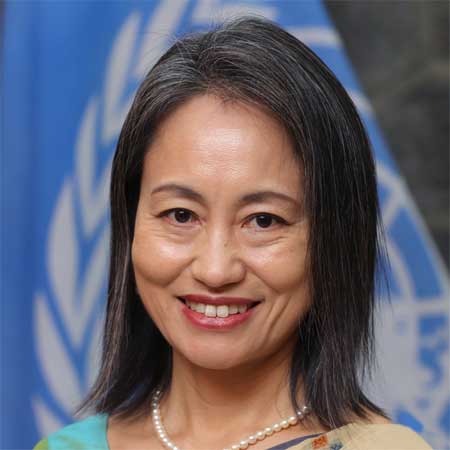Shoko Noda, Resident Representative UNDP, India
One in seven persons is poor in India instead of four in the past: Shoko Noda of UNDP, India
We should make sure that we continue to keep our focus on the poor and even leverage digital technology to improve the pace and accuracy of public service delivery even in remote areas.

About The Episode
Welcome to the full Episode 7 of Sustainability Karma, India’s first and only talk show on sustainability on All India Radio.
In this episode of Sustainability Karma, Shoko Noda, Resident Representative, UNDP – India, applauds India’s success in reducing multidimensional poverty from 25% to nearly 15% over five years. She also expresses concern at lag in progress globally in achieving Sustainable Development Goals (SDGs) and how India and the private sector can play a key role in accelerating the progress.
Elaborating about India’s noteworthy achievement in reducing multidimensional poverty as evidenced by a recent report, she adds that the Multidimensional Poverty Index (MPI) serves as a comprehensive tool, extending beyond income metrics to gauge poverty across health, education, and living standards. The index encompasses indicators such as nutrition, mortality rates, maternal health, schooling, and even access to electricity and financial resources. The latest national MPI report reveals a substantial reduction, with 125 million individuals escaping multidimensional poverty over the past five years, leading to a drop in the poverty rate from 25% to nearly 15%.
Saying that the rural-urban disparity persists, Ms Noda adds that at the same time the rural areas have shown faster improvement. States like Bihar, Madhya Pradesh, and Uttar Pradesh have witnessed the most significant reductions in poverty, attributed to advancements in nutrition, education, sanitation, and cooking facilities. India’s success in poverty reduction is attributed to its commitment, targeted pro-poor policies, and a multidimensional, multi-sectoral approach. Digital technology has emerged as a critical factor, enhancing the efficiency and accuracy of public service delivery, provided it is harnessed effectively.
At the same time, the UNDP India head, expresses concern about the lag in progress in achieving the United Nations Sustainable Development Goals (SDGs). The global scenario reveals challenges, with only 12% of the 169 SDG targets on track, 50% showing weak and insufficient progress, and more than 30% experiencing stalled or reversed advancements.
Despite these obstacles, Ms Noda says, India, as the most populous country, has a crucial role in global SDG success.
She acknowledges India’s leadership in shaping global policies that can have a far-reaching impact on the world economy. Key areas of focus include the SDG action plan, the intersection between climate and development, women-led development, financing for development and climate, digital technologies, and disaster risk reduction. Acknowledging the limitations of public resources, Ms Noda says, role of the private sector is essential for sustainable development. It is an engine of economic growth, job creation, and a source of revenue for social and economic infrastructure. The increasing awareness and consciousness of consumers further drive companies to adopt sustainable practices. The private sector is a vital player in SDG implementation, with the potential to address critical development challenges through innovative solutions.

